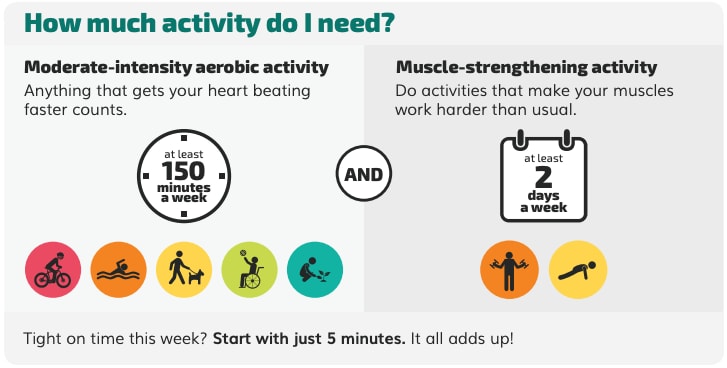Small lifestyle changes can help you prevent or reverse chronic disease
Over the past century, the U.S. has made remarkable strides in pharmaceutical treatments and the prevention of infectious diseases. However, a new wave of diseases has risen dramatically: chronic diseases stemming from lifestyle behaviors such as poor diets, lack of exercise, and poor stress management.
Chronic diseases have become too common in America
“Lifestyle diseases” such as cardiovascular disease, hypertension, and type 2 diabetes reduce your quality of life and can lead to further complications. Additionally, more than two-thirds of adults and nearly one-third of children and youth are overweight or obese.
Conditions like these are also expensive. The medical costs associated with these kinds of chronic diseases and conditions add up to hundreds of billions of dollars each year — not only from direct medical expenses, but also from the resulting losses in productivity.
“About half of all American adults—117 million individuals—have one or more preventable chronic diseases, many of which are related to poor quality eating patterns and physical inactivity.”
– U.S. Department of Health and Human Services
These conditions are preventable and reversible
Through small changes to your lifestyle and diet, you can invest in healthier lives for you and your family. The changes you make don’t have to be huge ones. In fact, it’s often simple, overlooked behaviors that you can tweak in order to start seeing improvements in your health.
***
How can you develop healthy strategies now to avoid chronic diseases later?
Starting today, you can build up healthy habits by improving your relationships with exercise, diet, sleep, stress management, and social connection.
Move more
The national recommendation for exercise suggests that you engage in at least 150 minutes per week (or 30 minutes a day for 5x per week) of aerobic activity (activities that get your heart rate up), and perform muscle-strengthening exercises (such as weightlifting, core stabilization movements, or squats) 2x per week.

www.cdc.gov
Some movement is better than none. Don’t get overwhelmed by stats, social media posts, or other directives that tell you how much you need to exercise. The important thing is that you start wherever you’re at.
“Physical activity doesn’t mean you have to go out and run a marathon, do aerobics, or do some kind of competitive sport. Even just walking for 20 or 30 minutes every day is good enough.”
– Dr. Ankush Bansal
Oftentimes when you start moving more, you will naturally increase the time you spend exercising, because it makes you feel good. So don’t stress about needing to exercise. Enjoy the movement and let the rest come naturally.
Eat higher quality foods with fewer additives
According to Dr. Ankush Bansal, diet is 80% of the journey for prevention. What you eat has big impacts on your daily energy, blood sugar levels, and immune system.
Get the majority of your meals from whole, plant-based foods, rather than “convenience foods” — those with long-shelf lives or that are pre-made. Foods with long-shelf lives are economically viable, but aren’t great for your health. They are often loaded with preservatives that keep them from going bad sooner. It’s good for short-term business, but bad for long-term (and even short-term) health.
Try to swap one “convenience meal” a day (anything pre-made or fast food) with one made from whole, plant-based foods. A good rule of thumb is to choose food items with the least amount of ingredients. Or, better yet, make the meal yourself and see firsthand each ingredient that goes into what you and your family eat.
Sleep better
Through sleep, your body repairs tissues, restores your energy levels, and releases hormones vital for growth and development. Quality sleep makes the difference between a productive, energetic day and one you just have to “get through.”
Poor sleep can increase your appetite, decrease your ability to effectively handle stress, and reduce the effectiveness of your immune system. Lack of sleep is also associated with increased likelihood of obesity, heart disease, and infections. It decreases your ability to focus, reason, and problem-solve during the day, making for a less effective day at work.
Aim for 7-9 hours of quality sleep per night, Dr. Bansal recommends. Consider forming a nighttime routine – a ritual that signals to your body and mind that it’s time to wind down and prepare for rest. Avoid using electronic devices in bed. Those devices stimulate your mind and can make you mentally associate the bed with productivity or entertainment, when it should signal rest and relaxation. Even reading is better done from a separate location than the bed. Try to make your bedroom as dark as possible when you sleep, and avoid caffeinated beverages in the late afternoon and evening.
Manage stress so that stress doesn’t manage you
More and more is being learned about the connection between stress and health problems. Stress affects your mood, ability to recover from illness, and likelihood of getting sick. SteadyMD’s Dr. Seth Larsen recommends meditation and mindfulness as ways to reduce stress.
“Minimize your stress by focusing on the things you can control and adding daily meditative practices. This will literally improve everything about your health.”
– Dr. Seth Larsen
For more information on how to start your own meditation practice, read our article How to Meditate to Help with Anxiety & Stress.
Other effective ways to manage stress include practicing yoga or incorporating regular stretching into your daily routine, taking walks, and spending time in nature. Taking breaks throughout the day away from work or other attention-demanding activities can also be very helpful in managing stress.
Maintain supportive social connections
Meaningful relationships are key to a fulfilling life. It’s been found that people who have a strong sense of community tend to live longer and report higher levels of life satisfaction. Some evidence even suggests that social isolation can worsen your long-term health more than obesity, smoking, or high blood pressure.
It may seem odd to view social connection as a “preventative health practice,” but having a sense of community has extensively documented health benefits. People who feel socially supported tend to experience fewer health problems, live longer, and reports higher rates of happiness compared to those who feel socially isolated.
***
Start building healthier habits today
By committing to small, consistent improvements in your lifestyle, you can help prevent chronic illness and optimize your daily health. When committed to, small healthy habits lead to long, healthy lives. Start today.
*****
Navigating your health can be confusing. There are a lot of mixed messages out there. It helps to have someone on your side who can not only clarify for you what information is worth listening to, but who can also tailor that information to your specific needs. SteadyMD gives you a partner in your healthcare in a personal online doctor.
Get started taking by taking our quiz and see which of our doctors would be your best match!
